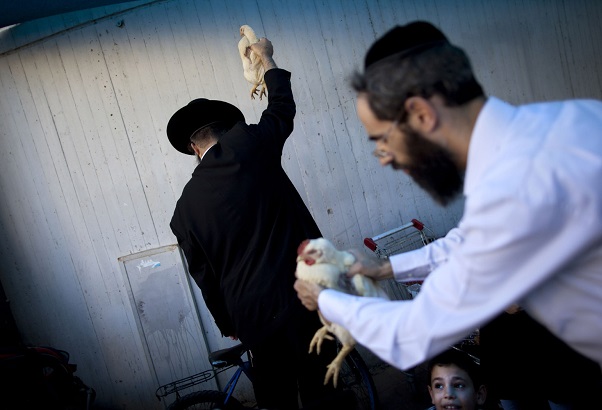Animal sacrifice here and there
[ by Charles Cameron — thinking of human, animal and symbolic sacrifice — also of “the lamb that was slain” ]
.
In Nepal:
Nepal temple bans mass animal slaughter at festival
In a victory for activists, Nepalese temple authorities have announced they will end a centuries-old Hindu tradition of mass animal slaughter that attracts hundreds of thousands of worshippers.
The festival, held once every five years, sees hordes of devotees from Nepal and India flock to a temple in the Himalayan nation’s southern plains to sacrifice thousands of animals in the hope of appeasing the Hindu goddess of power, Gadhimai.
**
From Brooklyn to Tel Aviv:
Jewish chicken-slaughter ritual gets OK from judge
All’s fair when it comes to slaughtering fowl on the streets of Brooklyn, a judge ruled Monday, clearing the way for thousands of chickens to be killed next week in a 2,000-year-old ritual.
Manhattan Supreme Court Justice Debra James ruled that the Orthodox practice of Kaporos, during which chickens are slaughtered before the high holy day of Yom Kippur to atone for sins, can proceed, knocking down a challenge by a Brooklyn animal-rights group.
**
Sacrifice may be one of the most profound values that we are losing in our rush to reductionism — and by this I wish to imply also that we are not sacrificing it, but simply forgetting it, permitting it to fade..
And yet I would be hard-pressed to define it.





September 16th, 2015 at 12:09 pm
When we no longer raise animals ourselves for food and transportation, the meaning of these rituals fades. I find them incomprehensible, have trouble interpreting them intellectually.
.
My immediate reaction to the first photo and description is that it is a re-creation of the horrors of war, with animals standing in for the people. Since it is to propitiate a goddess of power, perhaps that is its purpose. But that is more “better them than me” than what I think of as sacrifice. By all means, let us kill food animals and let them rot in the sun. Makes no sense.
.
The second may connect people with their ancestors and families by re-creating earlier rituals. I have a bit more sympathy for that, but not much. Avoiding cruelty is a value, too, and I find that more understandable. Some sacrifices have been abstracted into other sorts of ritual, why not this one? And I think the chickens are eaten in this one (could be wrong), so it’s not just throwing stuff away.
.
Let me suggest another way to illustrate sacrifice for the community in today’s world. We pass laws taxing gazillionaires to provide money for community improvements and support of those who can’t support themselves. Not much of a hardship for the gazillionaires, except in ego damage. But that’s a part of sacrifice too, no?
September 16th, 2015 at 1:54 pm
Cheryl:
.
It is Nepalese and Indians who were making and witnessing the sacrifice. They might live closer to the land and the animals than we so it may have had more immediate meaning for them. I wonder what they think of the temple authorities action which seems to have come at the behest of activists may not live so close to the land.
.
What kind of sacrifice is it if you don’t let them rot in the sun? Otherwise it is just a giant barbeque held every five years.
September 16th, 2015 at 2:36 pm
Animal sacrifice has only been subliminated into abstract representational ceremonies in Christianity. Judaism mostly (non ultra orthodox hasidim) but this is only because there is no Temple. If a Third Temple were rebuilt, modern Judaism would face a profound theological choice.
Islam still practices animal sacrifice.
September 19th, 2015 at 5:15 am
I have the feeling that sacrifice is somehow at the heart of life itself, the paradox or koan of “dying, we live” with various forms of sacrifice from the Aztecs via the Potlach to the sacrifice of the Mass as progressive approximations to the loss of self in that which, to add another twirl to the paradox, loses itself in us.
.
That the more deeply and thus clearly we understand sacrifice, the richer our lives become.